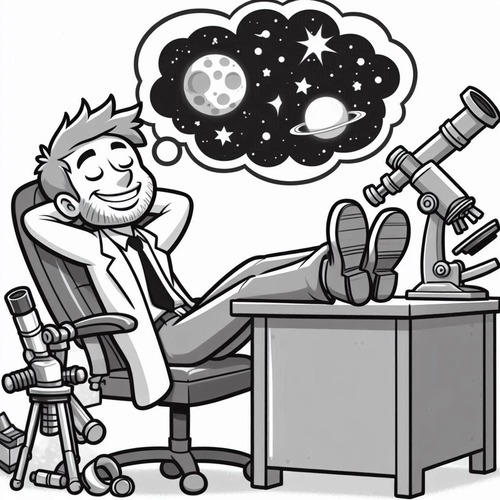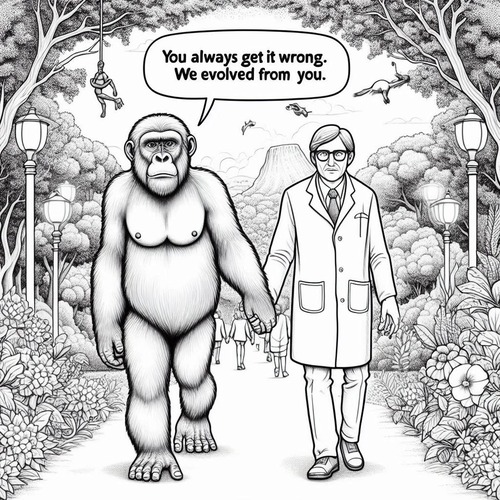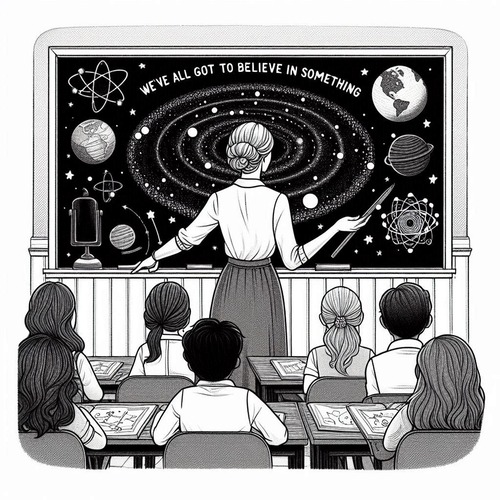Science, Faith, and the Grand Design of the Universe
Science Reinforces, not Buries, Faith in God
Have you ever wondered: surely there must be more to the universe than what science can explain? Doesn’t the evidence we see around us of the grand design of the universe point to a Creator? Granted, science, with its powerful tools and rigorous methods, has revolutionized our understanding of the cosmos. But can it answer the fundamental questions about the divine, about why we exist, and where we are ultimately headed?
The Boundaries of Scientific Inquiry: Science thrives on asking questions and seeking answers through experimentation and observation. It excels at explaining the “how” of the universe—how galaxies form and the laws of physics operate. It uses the scientific method, a process of forming hypotheses, testing them through experimentation, and refining those hypotheses based on the results. This rigorous approach has led to ground-breaking discoveries, from the vastness of the cosmos to the microscopic world of DNA.
However, science has limitations. It doesn’t delve into the realm of the “why.” It can’t tell us if there’s a creator behind the grand design of the universe, a guiding force behind the astonishing fine-tuning of physical constants that allow for life. For example, the Anthropic Principle suggests the universe’s fundamental laws seem specifically tailored to support the existence of life, but science can’t explain why these specific constants exist, or if there’s an intelligence behind this design.
Intellectual Giants and the Harmony of Faith: History is filled with brilliant scientists who saw no conflict between their scientific pursuits and their faith. Thinkers like Isaac Newton, who made ground-breaking discoveries in physics and mathematics, and Francis Collins, a geneticist who led the Human Genome Project, both found their scientific discoveries instilled a deeper sense of awe for a divine architect behind it all. These individuals exemplify how science and faith can coexist and even inform each other. Scientific understanding can deepen our appreciation for the divine, while faith can inspire a sense of wonder and a drive to explore the natural world.
Modern Discoveries and the Case for a Creator: Modern scientific breakthroughs haven’t diminished the concept of a higher power; they’ve often amplified it. The incredible “fine-tuning” of the universe is a prime example. Even slight variations in physical constants like the strength of gravity or the electromagnetic force could render life impossible. This delicate balance points towards a deliberate design, hinting at an intelligent force behind creation. Additionally, the vastness of the universe and the improbability of life arising spontaneously from non-life continue to spark wonder and inspire questions about the origins of everything.
The Quest for Meaning Beyond Molecules: Science sheds light on the intricate mechanisms of nature, but it can’t answer the existential questions that tug at the human heart: “What is our purpose?” “Why are we here?” “What happens after we die?” These profound inquiries explore the realm of philosophy and religion. Spiritual traditions offer guidance and meaning, providing a framework where science leaves off. Religion often delves into questions of morality, ethics, and the human condition, offering a source of comfort and purpose for many people.
The Resurrection: A Pillar Beyond Scientific Scrutiny: Christianity, for example, bases its faith not on scientific proof but on the historical reality of Jesus Christ’s resurrection. This cornerstone of the faith transcends scientific verification. The resurrection narrative is a foundational belief for Christians, offering a transformative experience that intersects with history but lies outside the realm of scientific testing. Science can analyse historical documents and archaeological evidence related to Jesus, but it cannot definitively prove or disprove the resurrection event itself.
A Convergence of Knowledge and Belief: Science and faith, ultimately, are not rivals but complementary paths in our quest for understanding. As science unveils the secrets of the physical world, religion contemplates the vast realm of the metaphysical. Each scientific discovery, from the elegance of DNA to the vastness of the cosmos, can be a gateway to a deeper sense of awe and wonder, a recognition of the magnificent tapestry woven into the fabric of existence. Finding a way to integrate scientific knowledge with our sense of purpose and place in the universe can be a deeply personal journey.
Evolution and Faith: Complementary Realities The theory of evolution, a cornerstone of modern biology, describes the process by which species undergo change over time through natural selection. Far from conflicting with theistic beliefs, this scientific narrative can be viewed as a testament to the ingenuity of the Creator. The dynamic and adaptive nature of life on Earth showcases a world imbued with potential and a capacity for diversity that could be seen as reflective of divine intention.
A Divine Symphony in Genetic Variation Rather than diminishing the role of a creator, the intricate mechanisms of evolution may highlight the sophistication of a divine blueprint. The genetic variations that drive evolutionary change could be perceived as notes in a grand symphony, composed by a higher intelligence, allowing life to flourish in harmony with the environment. This perspective invites believers to marvel at the creative power that has set the stage for life’s complex journey.
Conclusion: Science and faith, then, needn’t be seen as opposing forces. Science, with its rigorous methods, unveils the wonders of the universe, from the microscopic world of DNA to the vast expanse of galaxies. While it excels at explaining the “how” of the universe, it leaves room for the “why.” This is where faith steps in, offering meaning and purpose, grappling with the existential questions that science can’t answer.
Don’t let anyone tell you scientific advancements inherently disprove the existence of a higher power. In fact, many scientific discoveries, like the incredible fine-tuning and grand design of the universe, can ignite a sense of awe and wonder, pointing towards a Creator. Embrace the beauty of scientific exploration, but also hold onto the power of faith. They can coexist, enriching each other and leading us down a path of deeper understanding and a profound sense of wonder at the universe we inhabit.
Related Reads
- Doubting Darwin, Trusting Creation: 10 Challenges to Darwinian Evolution
- Conspicuous Gaps in the Evolution Narrative
- Exploring the Scientific Case for Creation
- The Cambrian Explosion: How is it a Challenge for the Evolutionist?
- The Universe’s Origin: Gaping Holes in Naturalist Explanations
- Creation or Evolution: Let the Evidence Speak for Itself
Editor's Pick

Self-Authentication: Why Scripture Doesn’t Need External Validation
"How can the Bible prove itself? Isn't that circular reasoning?" This objection echoes through university classrooms, coffee shop discussions, and [...]

Do Christians Need Holy Shrines? Why the Reformed Answer Is No
Walk into a medieval cathedral and you'll encounter ornate shrines, gilded reliquaries, and designated "holy places" where pilgrims gather to [...]

I Want To Believe, But Can’t: What Do I Do?
"I want to believe in God. I really do. But I just can't seem to make it happen. I've tried [...]

BC 1446 or 1250: When Did the Exodus Really Happen?
WHY REFORMED SCHOLARS SUPPORT THE EARLY DATE Many a critic makes the claim: “Archaeology has disproven the biblical account [...]

Does God Know the Future? All of It, Perfectly?
Think about this: our prayers tell on us. Every time we ask God for something, we’re confessing—often without realising it—what [...]

Can Christian Couples Choose Permanent Birth Control?
Consider Sarah, whose fourth pregnancy nearly killed her due to severe pre-eclampsia, leaving her hospitalised for months. Or David and [...]

Bone of My Bones: Why Eve Was Created From Adam’s Body
"This at last is bone of my bones and flesh of my flesh!" Adam's joyful exclamation upon first seeing Eve [...]

Is Calvinism Fatalism in Christian Disguise? Think Again
We hear the taunt every now and then: "Calvinism is just fatalism dressed up in Christian jargon." Critics argue Reformed [...]

Can Churches Conduct Same-Sex Weddings?
In an era of rapid cultural change, churches across America face mounting pressure to redefine their understanding of marriage. As [...]

Gender Reassignment: Can Christian Doctors Perform These Surgeries?
In the quiet of a clinic, a Christian physician faces a challenging ethical question. A patient sits across the desk, [...]
SUPPORT US:
Feel the Holy Spirit's gentle nudge to partner with us?
Donate Online:
Account Name: TRUTHS TO DIE FOR FOUNDATION
Account Number: 10243565459
Bank IFSC: IDFB0043391
Bank Name: IDFC FIRST BANK






